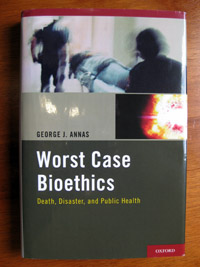Worst Case Bioethics: Annas Explores Death, Disaster and Public Health in New Book
In a new book published by Oxford University Press, BU School of Public Health Professor George Annas employs contemporary disputes involving death and disaster to explore the radical changes underway in public health practice, human rights discourse to promote health, and the application of constitutional law to medicine.

American bioethics, still in its infancy, is routinely called on by the government to provide political cover for controversial public health decisions involving the life and death of Americans, Annas argues in Worst Case Bioethics. Doomsday or worst-case scenarios are often at the heart of these bio-political decisions. A central feature of science fiction, these scenarios can impart useful insights, he says.
But worst-case scenarios can also be unpredictably destructive, undermining both preparedness and the very values that bioethics seeks to promote, Annas finds. Discovering a new flu strain, for example, leads immediately to visions of the 1918 flu pandemic, the worst in human history. Likewise, a “ticking time bomb” scenario leads to reliance on lawyers to justify torture and physicians to carry it out, he says.
In the book, Annas, chair of the BUSPH Department of Health Law, Bioethics & Human Rights, explores the worst-case charge of “death panels,” which continues to threaten meaningful healthcare reform in the U.S. Fundamental change in American healthcare, he argues, will require fundamental change in America, including confronting our obsession with technology and our denial of death, and replacing our over-reliance on the military and market metaphors in medicine. “A combination of the ecological and rights metaphors could help us successfully navigate the waters of change,” he writes.
Annas looks at how worst-case scenarios distort debate, limit options, rationalize human rights abuses, and undermine equality and social justice. He concludes, nonetheless, that it is possible to temper worst-case scenarios in ways that promote both the development of a meaningful American bioethics, and a life and liberty affirming global health and human rights movement.
Worst Case Bioethics addresses current debates on American and global medical issues, including national health care, experimental cancer drugs, quality of medicine and patient safety, preparation for a global flu pandemic, and regulating/outlawing cloning and germline genetic alterations. It also addresses national security issues such as the best response to bioterrorism; force-feeding hunger strikers at Guantanamo; and killing civilians in Afghanistan — with emphasis on the roles played by physicians and lawyers in each.
Annas is William Fairfield Warren Professor at BU, professor in the BU schools of Medicine and Law, and co-founder of Global Lawyers and Physicians, a transnational group that promotes human rights and health.
More on the book can be found on the Oxford University Press website.